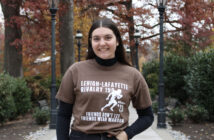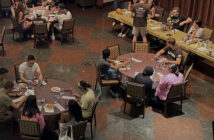“Gay sorority president, isn’t that a contradiction?” reads a whiteboard held in the hands of Madison McGahan, ’15, an openly lesbian student and president of Zeta Tau Alpha.
This photo of McGahan served as her coming out announcement to the Lehigh community.
It was posted on March 24, on the Facebook page I, Too, Am Lehigh, “aimed at generating discussions around the microaggressions marginalized individuals encounter,” according to the page. McGahan’s photo garnered over 485 likes, making it the second most liked post on the page.
Earlier that day, she had received a phone call from Eryne Boyle, ’15, and Haleigh Smith, ’14, the two students running the page, telling her to meet them at Campus Square at 5 p.m.
McGahan assumed they wanted her help regarding recent insults being made on Yik Yak towards Greek life, calling certain chapters gay. But she never imagined that she was personally going to get involved.
When McGahan arrived, she was given a whiteboard. She was told to write down something that had been said to her about being gay. A photo of her holding the whiteboard would be put on the Facebook page.
“I didn’t know what the reaction was going to be,” McGahan said. “I was really nervous because I didn’t want my sorority to get mad at me if there was backlash.”
But McGahan decided that if she didn’t do it, she would regret it. She wrote down something that was said to her at a fraternity party regarding her two seemingly conflicting identities.
Later that night, the photo was posted to the Facebook page. McGahan heard from friends from both high school and college supporting her in her coming out.
“No one said anything bad to me and it was just all positive support; that was the push to get me out into the community and talking about more LGBT issues,” she said.
This experience from last year is very different from where McGahan was when she first came to Lehigh. She was not out, and she was not ready to talk about these issues.
“I went in with the stance that I’m not really sure of my identity, I don’t really want to talk about it and I didn’t want to be judged,” she said.
She joined Zeta Tau Alpha and was appointed president at the beginning of her sophomore year. At this point, she knew she was gay, but no one else did. She told a small group of friends at the end of her sophomore year and most of the chapter knew by the first semester of her junior year.
“I wanted to get more involved because I saw there was such a huge issue and lack of understanding,” she said.
So she started to talk more about being gay and came out to some administrators. After her post on I, Too, Am Lehigh, most of the community knew about her sexual orientation.
Jonathan Jean-Pierre, ’15, entered fraternity recruitment his first year open and vocal about his sexuality.
“I came out over winter break and I made that clear when I was rushing that I wanted to be out and be part of a fraternity or organization that was going to accept my sexuality,” he said.
He felt that Delta Upsilon was an organization that would accept him, even though “some of the guys had never really interacted with someone who was LGBT.”
Liz Pines, ’16, is out as a lesbian and is not a member of a Greek chapter at Lehigh. Pines has been out since she was 16, and her sexual orientation has always been part of her identity.
She originally didn’t think her sexual orientation was part of why she didn’t want to join a sorority, but later realized that it was a factor.
“I perceived (Greek life) a lot better when I first got here than I do at this point in my life, but I never considered joining,” Pines said.
She described herself as a very independent individual. As a member of the LGBT community, Pines sees the role Greek life plays in creating divisions in the Lehigh population. She said she believes Greek Life has polarized the LGBT community.
‘No fraternity wants to be seen as the gay fraternity’
Within the Greek community itself lies a fraternity-sorority division. There is a difference in the way fraternities interact with the LGBT community versus the way sororities interact with the LGBT community.
“Fraternities are the ones creating the bias incidents, but then sororities are the ones cleaning up and trying to make a better name for Greek life,” McGahan said.
This trend is evident in the makeup of the Greek Allies executive board. Greek Allies was revived this year after it died out when the previous executive board graduated. Its goal is to educate the Greek community on how to be more accepting and to spread this mission to the Lehigh community, according to Elizabeth Campbell, ’15, the president of Greek Allies and a member of the Panhellenic Council.
While Greek Allies plans on holding elections next semester to get a more varied representation, the executive board of the organization is comprised of all women and most are in Kappa Alpha Theta.
“I think the women on this campus, both in Greek life and not in Greek life, are doing really great things,” Pines said. “I think leadership on the part of men is dismal.”
This lack of leadership doesn’t come from a lack of LGBT men on campus or lack of power. McGahan said there are men in fraternities who are out as gay, but they aren’t pushing to make change in the community.
“A lot of guys in fraternities do have a lot of social power on this campus and I don’t feel like much is being done from a fraternity standpoint,” Jean-Pierre said.
Pines said she knows men in Greek life who have secret lives and partners, but don’t talk about them. She thinks Lehigh’s culture tells men who join Greek life that they have to suppress their LGBT identities.
“No fraternity wants to be seen as the gay fraternity,” McGahan said.
Jean-Pierre’s experience in Delta Upsilon has been mostly positive. He feels accepted in his chapter, but said that it did take a period of time for some of the brothers in his fraternity to adjust.
“If you’re openly out on the Hill and choose to express your gender identity in a more feminine way, or something that is not stereotypical Greek for fraternities, you tend to be marginalized or excluded in certain settings,” he said.
Jean-Pierre said he pushes his brothers to be more inclusive, but there is still progress to be made. His brothers are open to his sexual orientation, but Jean-Pierre said when he uses certain language or acts a certain way some of them get nervous.
“Guys, especially in fraternities, need to be more educated about not only the LGBT community but also other marginalized groups of people on campus, so that there isn’t a barrier,” he said.
Sustainable change
Not only fraternities are encouraging a culture that stigmatizes different sexual orientations. McGahan said that social pressure in Greek life as a whole does not help those who may be LGBT.
McGahan has become more active in Lehigh’s LGBT community over the past two semesters. She has used her internship at the Women’s Center to help foster an accepting community on campus through her work organizing Lehigh’s first Pride Walk.
As a student active in both Greek life and the LGBT community, McGahan sees how the two groups interact and can serve as a go-between. She credits the Greek community for her leadership development.
“If I didn’t start out as a leader in Greek life before I came out, I don’t know if I’d have the motivation to be that leader in both communities that can work to tie the two together,” she said. McGahan even said that she “might not have come out” if she had joined a different sorority.
“I don’t think a lot of chapters reach out, or they tend to reach out in terms of after something has happened,” Campbell said. “It’s not for real reasons, it’s from a PR standpoint and it looks good.”
Greek Allies is working on developing two different groups: Greek allies, people that are trained in how to give support and how to be an ally, and chapter allies, people who are liaisons to chapters and communicate information back and forth between the chapter and Greek Allies.
“I feel like there has been progress in terms of there is a dialogue going and I feel like a lot of administrators are open and providing a safe, welcoming environment,” Jean-Pierre said.
Pines believes action needs to be taken, but there are not leaders in the LGBT or Greek communities that are willing to take on this responsibility.
“Until there is leadership to be making change it’s really hard to say ‘we’re going to be more inclusive,’” she said.
Greek Allies is working on getting these potential leaders to emerge through developing programming and workshops for chapters. Its first SafeZone training will take place next semester.
Campbell said she believes there are more people in the Greek community that identify with the LGBT community, but are not comfortable talking about it.
McGahan noted that it is important to foster an environment where it’s not stigmatized for someone to come out.
“The more you make it a big deal, the less comfortable people feel coming out, because they don’t want to be that person,” she said. She encouraged all chapters to be more aware that not everyone is heterosexual, and people in Greek life may want to go about expressing their sexuality in their own way.
McGahan believes that a lot of problems stem from students not having someone they can relate to who is gay and Greek.
“For Zeta, I don’t think they’d necessarily be jumping to create change, but they know my story, they know me, they know it’s important to me so they’re gonna have my back,” she said.
Not every member of a Greek chapter has a person like McGahan from whom to learn and communicate with about the issues. For this reason, it is imperative to have a blatant conversation regarding the Greek community, the LGBT community and their impact on one another, Pines said.
Some groups with the responsibility to elicit change, Pines listed, include Greek leadership, the Office of Fraternity and Sorority Affairs, and Lehigh as an institution. Students are here for four years and can only accomplish so much sustainable change, she said.
“It’s easy for someone to say ‘I’ve got your back because I am an ally,’” Pines said, “but it’s much harder when you’re at a party or in a social setting where things are being said in the heat of the moment to stand up and be an ally.”





Comment policy
Comments posted to The Brown and White website are reviewed by a moderator before being approved. Incendiary speech or harassing language, including comments targeted at individuals, may be deemed unacceptable and not published. Spam and other soliciting will also be declined.
The Brown and White also reserves the right to not publish entirely anonymous comments.
1 Comment
Why do we need a Fraternity system again?